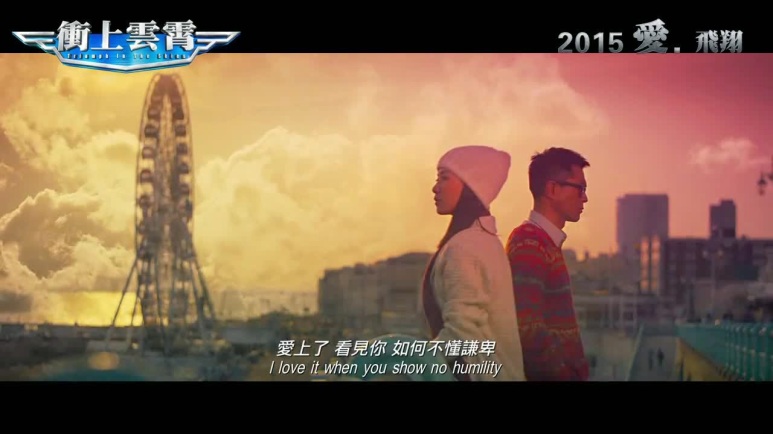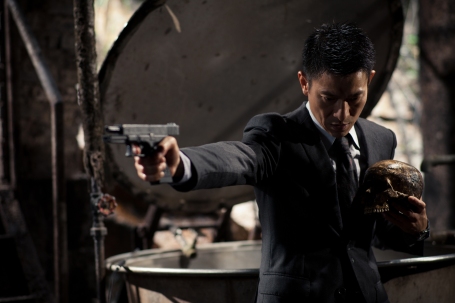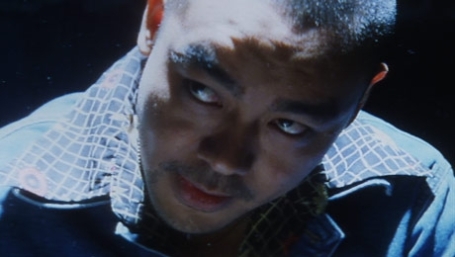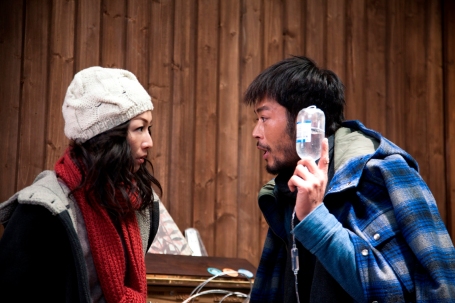Posts tagged ‘sammi cheng’
Together Again: Triumph In The Skies and the Rebranding of Francis Ng
The day-and-date release in the U.S. of the movie version Triumph In The Skies (more popularly known as TITS) represents a renaissance of sorts for my boy Francis Ng, who’s enjoying a resurgence of popularity after a bunch of down years. Although probably best known for his straight-up thuggin’ in classic HK gangster movies like Young & Dangerous, The Mission, Exiled, and many many more, Francis has in the past year or so managed to reinvent himself and his public persona as a romantic lead, a family man, and an overall good guy. Ironically, although Francis is mostly a movie king, his rebranding has been based mostly on the popularity of a couple recent television series.
The sequel to the Hong Kong drama on which TITS is based started Francis on his road to recovery back in 2013 as TITS 2 racked up the ratings and online views in both HK and China. Francis reprised his role as Sam Gor, the serious and intense pilot for the fictional HK airline Skylette who moons over his dead wife and hooks up with the young hottie Holiday Ho. As with the original TITS back in 2004, HK audiences (as well as a sizable number of watchers in China) lapped it up and Francis’ popularity, which had mightily declined for a number of reasons (crappy film selection, aging, orneriness, and overall poor career choices) started to rise again.
But what really got things going again for Francis was another television series, the Hunan TV reality show Dad, Where Are We Going 2? which aired in 2014 and in which Francis starred with his darling boy Feynman, then five years old. The show features six celebrity dads and their ultra-cute offspring wandering the hinterlands of China and interacting with their country cousins. Due in large part to the otherwordly twee charm of his kid and his strict but loving interactions with said child, Francis made a big impression as a warm-hearted patriarch and counteracted his past rep as both a movie villain and a pain-in-the-ass diva actor. Francis released a film while the show was airing, The House That Never Dies, which was a huge box-office success in China due in no small part to his popularity on DWAWG.
Because of the popularity of TITS2, TVB, in association with Shaw Brothers, MediaAsia and its China-based subgroup China Film Media Asia, and a couple other China-based entities, have thus teamed up to produce a film version of the iconic drama series about Hong Kong flight crews and their various romantic entanglements. But despite bringing back Francis as Sam Gor, as well as Julian Cheung Chilam as Jayden “Captain Cool” Ku, the film doesn’t manage to recreate the melodramatic success of the original 2004 series or its 2013 sequel.
To start with, the movie drops the viewer in medias res, which is fine if you know the backstories of the various characters, but is utterly frustrating for those unschooled in the minutiae of the characters or their past television lives. Weirdly enough, while relying on the audience’s assumed knowledge of the show, the movie also eliminates a lot of key narrative elements from the series, including the crucial love triangle between Sam, Jayden, and Holiday (who is gone completely missing in the movie), and in the film Sam and Jayden don’t even appear together. The film’s story consists of three vignettes featuring Sam, Jayden, and newcomer Branson (played by the inexpressive Louis Koo) which don’t interlock in any meaningful way. Aside from one scene, none of the male leads interact with each other, and Jayden seems to be on another continent for the entire film. Each of the vignettes lack any kind of dramatic tension, with almost nothing at stake for the characters, and they resolve in the most predictable ways possible. The film as a whole is missing self-awereness, irony, wit, or anything that might add a bit of an edge to the film, and the three narratives play out like long-form wristwatch adverts, with gratuitous product placements of bottled water, designer chocolates, and jd.com, the Chinese shopping site that miraculously ships within hours from Asia to London.
The lead actors don’t look too bad for their age (with Francis in his fifties and Chilam and Louis both mid-forties), and Charmaine Sheh and Sammi Cheng as the love interests are feasible and not too mismatched. Amber Kuo as Jayden’s girl-toy appears to be way too young for him, though, and their vignette in particular is pretty cringeful, relying on a remarkably tired plot twist and saddling poor Chilam with horribly clichéd romcom dialog about hearts living in other people’s bodies and the like. Sammi Cheng as a pop star (what?) is cool with her tattooed knuckles and hard-part eyebrow and she and Francis make a pretty pair, but the impetus for their hook-up is completely contrived. As a fangirl I did enjoy the sight of Sam Gor practicing his dance moves, but the question still remains: WHAT HAPPENED TO HIS FORMER GIRLFRIEND? There is also a gratuitous subplot involving a pair of mainland Chinese characters that concludes in the cheesiest way possible and which seems tacked on just so the PRC audience can hear a bit of Putonghua (inexplicably, the actor playing Louis Koo’s father also speaks Mandarin, though Louis Koo’s dialog is strictly in Hong Kong Cantonese).
As usual Francis does his thing, acting with his mouth full of food and with his eyebrows quirked, but honestly he doesn’t have a whole lot to do. There’s also a tiny bit of TITS fan service with Kenneth Ma and Elena Kong reprising their characters from the television drama and Kenneth Ma is anonymously humorous in the twenty seconds that he’s onscreen, but their appearances only underscore the calculated genesis of the film, in which the producers are trying to suck in as many customers as possible.
The entire viewing experience is like injesting an extra-large serving of Kraft Cheese Food Sticks, with lens flare, rainbows, designer clothes, and saturated color correction making for a pleasant but ultimately vacuous optical experience. Coming from a straight-up fanperson like myself who really wanted to like this movie, I think that, for all of its interminable schmaltziness, the TVB drama is actually a better product, since at least it had some interesting character conflicts and gave its performers space to emote a bit. The movie version is all hat and no cattle, with beautiful sunsets and ferris wheels and not much else. But the movie was number one at the box office in Hong Kong during the Lunar New Year holiday and made more than 100RMB during the same time period in China, which bodes well for Francis Ng and his rebooted career. He’s currently working on a film with Zhou Xun, he recently wrapped another Chinese romcom, Love Without Distance (directed by Hong Konger Aubrey Lam), and there’s already talk of another film sequel to TITS (noooooo!) Meanwhile, the Chinese film commerce machine rolls on, as TVB is planning to cash in with a movie version of another one of its recent dramas, Line Walker, with Nick Cheung and Lau Ching Wan rumored to star.
I guess I shouldn’t be surprised that a mainstream movie like TITS is so overtly commercial, but being an optimist I always hope that these undertakings might squeeze in a bit of craft and care and maybe even some genuine artistry. No such luck here, but kudos to Francis Ng for riding the wave and coming out on top once again.
Love Hangover: Temporary Family and But Always movie reviews
A couple Chinese-language romantico films made their way into the U.S. market this week and one works while the other doesn’t. Hong Kong release Temporary Family uses the backdrop of the superheated HK real estate market to frame its romantic comedy, while PRC rom-dram But Always flails about in China and the U.S. as it attempts to tell its story of lovers pining for each other across years and continents.
Hong Kong renaissance woman Cheuk Wan Chi (aka Goo-Bi GC aka Vincci aka G) directs Temporary Family, an amusing romcom starring A-listers Nick Cheung and Sammi Cheng, along with mainland Chinese starlet Angelababy and rapper/singer Oho (who sings the title track). A broad, hyperlocal comedy that sends up the tight housing crunch in the former Crown Colony, the movie also includes cameos by Heavenly King Jacky Cheung, TVB stars Myolie Wu and Dayo Wong, and Chinese film star Jiang Wu (as an ultrarich PRC real estate speculator) and, not surprisingly, the movie has been a huge hit in its home territory. Although the film tilts towards the slapstick at times it still manages to sustain its narrative tension for most of its running time and is an agreeable timepass. Nick Cheung (Lung) started his career back in the day as a Stephen Chow wannabe so it’s not surprising to find him successfully tempering his usual dramatic intensity in a lighter comedic role. Sammi Cheng pulls out her neurotic jilted lover persona most famously seen in Johnnie To’s huge romcom hit Needing You, this time playing Charlotte, a recent divorcee unable to break from the past. Angelababy plays Lung’s adopted daughter, a slouchy millennial who bounces aimlessly from one low-paying job to another. Oho rounds out the main characters as the awesomely named Very Wong, Lung’s intern and the scion of an unnamed rich man in China. The plot contrives to throw together this unlikely crew as temporary roommates in a luxury condo in Hong Kong’s toniest neighborhood as they attempt to cash in on the real estate market’s volatility.
The movie is chock full of local references and in-jokes (why do all the real estate agents have bleached blonde hair?) and follows the time-honored Hong Kong movie tradition of good-natured vulgarity, including a running joke about a stray pubic hair. Structurally the film recalls the slackly constructed, improvisational comedies of Hong Kong Lunar New Year films and, maybe due to director G’s relative inexperience (this is her second feature), at times scenes abruptly and inexplicably fade to black. Though the movie’s energy flags a bit about two-thirds in, the amiable cast powers through the rough patches and manages to pull out a reasonably entertaining conclusion including the sardonic last scene, as Lung and Charlotte finally find their bliss. Nick Cheung as the desperate realtor Lung is as always quite watchable. Sammi Cheng is somewhat less so, as her neuroticness precludes much lovability, which in turn spoils any chemistry she and Nick might have had.
The movie has been a big hit both in Hong Kong and the PRC, and it’s great to be able to see it here in the U.S. on the big screen, if only to ogle the panoramic shots of Hong Kong harbor and its skyline at night. I had no luck tracking down the U.S. distributor so I was a bit surprised when it popped up here at the Metreon, but I’m glad that I ran across its screening schedule in a random facebook post. It looks like some Chinese distributors are following China Lion and Wellgo’s lead in targeting the Chinese-speaking audience here in the States, although their choice of films is somewhat random. But I’ll take what I can get, especially if it means releases of non-action films like Temporary Family and Pang Ho-Cheung’s Aberdeen, which showed up without fanfare down in Santa Clara a month or so ago.
Like those two films, the Nic Tse/Gao Yuan Yuan romantic vehicle But Always had a day-and-date release here in the Bay, but the movie is no great shakes and is in fact one of the worst, most hackneyed and clichéd films I’ve had the misfortune to witness in a long while. Granted, I don’t go see a lot of romantic films, since my preference is for movies with guns and gangsters, but I know a bad movie when I see one. Not only is the storyline derivative and the narrative conflict forced, but the characters are poorly drawn and the film’s direction is sloppy and amateurish.
The movie starts in 2001 in New York City, then flashes back to 1970s Beijing where Anran (Gao Yuan Yuan) and Yongyuan (Nic Tse), are young kids. This is the best part of the film as the movie renders mid-century China as comfortably shabby and not yet touched by modern global capitalism. The movie then laboriously follows Anran and Yongyuan’s relationship through the years in both China and the U.S. as they hook up, fall apart, and reconcile numerous times for no apparent reason except to generate dramatic angst. The film trowels on the melodrama as suicide attempts, love triangles, jilted lovers, and other tragedies mount. The only things missing from the hit parade of drama trauma are amnesia, long-lost twins, and a car crash, though the ending surely tops these in its maudlin, fatalistic conclusion. Hint: the date and place of the lovers’ last rendezvous gives away the fantastically tragic coincidence at the film’s climax.
Nic Tse and Gao Yuan Yuan are nicely lit and photographed throughout, though Nic seems a bit embarrassed to be in such a crappy flick. It’s also funny to note that, being a PRC production, we get to see his a lot of his beautiful torso and cut abs but almost none of her naked skin except a decorous peek at her bare shoulder.
There’s nothing wrong with the old-time narrative of star-crossed lovers patiently waiting for each other through endless adversity and I’m all for a well-told version of a classic story, but this movie is not that. Instead it’s a lazy, clumsy rehash of tired tropes without any freshness, originality, wit, or style. Yeah, I didn’t like it much.
Glorious Days: Hong Kong Cinema at the San Francisco Film Society
This year’s edition of Hong Kong Cinema at the San Francisco Film Society is chock full of star power, with new movies from some of the biggest movie kings and queens in Hong Kong. The opening night film, Bends, starring the glorious Carina Lau as a wealthy woman and the beautiful Aloys Chen Kun as her driver, looks at class divisions in contemporary Hong Kong. Cantopop also shows up in the festival, with Sky King Jacky Cheung appearing in A Complicated Story, and singing groups Grasshopper and Softhard featured in the documentary The Great War: Director’s Cut.
The festival also features a mini-retrospective of work by the late Lau Kar-Leung, the legendary martial arts director who died earlier this year, with rare big-screen presentations of 36th Chamber of Shaolin (1977) and The Eight Diagram Pole Fighter (1984), both starring the great Gordon Liu.
Also on tap is Johnnie To’s Blind Detective, starring another Sky King, Andy Lau, and his rom-com soulmate Sammi Cheng, together on screen for the first time since 2004’s Yesterday Once More. The premise is similar to To’s earlier film Mad Detective, in which the main character, here with the added characteristic of vision impairment, re-enacts past crime scenes in order to glean clues about the crime. The sight-challenged detective, played by Andy Lau, teams up with Ho (Sammi Cheng), a cop searching for a missing childhood friend.
The movie will probably be a rude shock for anyone expecting a Johnnie To movie like, say, Drug War or Exiled, as it’s pretty much a slapstick comedy with a few action elements sprinkled in. The film definitely leans toward the comic as the cast performs at a fever pitch, mugging and shouting at each other at the top of their lungs—at one point you can actually see the spittle flying from Sammi’s mouth as she bellows away. It’s a crazy farce that probably isn’t for everyone, but I had a great time watching Andy and Sammi go at it in the best screwball comedy tradition. Everyone seems to be enjoying themselves and a wacky good time is had by all, with the genial Andy Lau not afraid to look like an idiot talking with his mouth full and director To framing his stars against huge adverts for tea cakes.
Quite a few of To’s most deadly serious gangster flicks still have little timeouts for a spot of off-kilter humor, such as Nick Cheung eating a porcelain spoon in Election, or badass bodyguards playing paper-ball football in The Mission, or Anthony Wong, Francis Ng, Lam Suet, and Roy Cheung in Exiled fixing up Nick Cheung’s shot-up flat like the triad edition of This Old House, and some of To’s movies, like Too Many Ways to Be Number One or Mad Detective, are one big comic goof. It’s one of the little quirky things that make Milkyway Image films so fun and such a departure from your standard crime movie, since they ride the spectrum from brutal violence to comic relief so rapidly and unexpectedly. So it’s not surprising to find To indulging in his zany side in Blind Detective. It’s a pretty silly movie and there’s a lot of extraneous nonsense, but it’s great to see Andy and Sammi, co-stars of seminal Milkyway rom-coms like Needing You and Love On A Diet, together again and playing off of each other comfortably and naturally. Even if Blind Detective isn’t as brilliantly bleak as Drug War or Election, the movie is confidently executed since, not unlike the titular hero, To can make these movies with his eyes closed.
More Hong Kong movie royalty make an appearance in The Last Tycoon, starring the legendary trio of Chow Yun-Fat, Sammo Hung, and Francis Ng, along with mainland star Huang Xioaming. The movie is a remake of The Bund, the 1980s Hong Kong drama that made CYF a household name as a righteous gangster rising through the ranks in 1930s Shanghai. The series was remade a few years ago with HXM in the same role that CYF played back in the day and, in a bit a stunt casting, in The Last Tycoon they reprise that role, with HXM playing the younger version and CYF the older version. The two also swapped dubbing chores for each other, with HXM voicing the character in the Mandarin dub and CYF working the Cantonese dub.
The film also features CYF and Francis Ng on the big screen together for the first time, despite both having long and storied careers in the Hong Kong film industry. Both performers rely heavily on body language and facial expressions in their acting technique, with Chow the king of the sorrowful gaze who lets his evocative eyes tell the story. Chow’s held up remarkably well for a man in his late fifties and now possesses the regal bearing suitable for this role. He’s also still quite handsome so it was entirely plausible that he would be a babe magnet involved in a love triangle with Monica Mok and Yolanda Yuen.
Francis Ng’s character isn’t a stretch for him as it’s his typical sinister bad guy role, but through his gestures and mannerisms he imbues the character with menace and unctuousness, and the intensity of his posture and the threatening way he smokes a cigarette attest to his skill and talent in bringing to life even the most banal character. Sammo Hung swaggers through the film as a corrupt cop but alas doesn’t get to show off much of his martial arts chops, but the real gangsta role goes to Hu Gao as CYF’s no-nonsense, butterfly-knife wielding bodyguard. The movie has an expensive look and feel to it (producer Andrew Lau may have also had a hand in the gorgeous cinematography) but director Wong Jing doesn’t quite have enough of a handle on the pacing or action to make the movie really move. With all that on-screen talent the movie should’ve been a knockout, but it’s more of an expensive misfire.
The festival closes with two more big-time Hong Kong movie stars, Nick Cheung and the third out of four Sky Kings, Aaron Kwok (what, no Leon Lai?) in Conspirators, but I can’t really recommend this Oxide Pang-directed thriller. The movie follow Kwok as a traumatized detective searching for clues to his parent’s murder some thirty years prior who hires a private eye (Cheung) to assist him. Set in Malaysia, the movie feels like a cheap 1970s Asian action film, and not in a good way. Nick Cheung is solid as Zheng, the Malaysian private eye, but due to an extraneous twin brother plot device he’s burdened with a bad wig for most of the movie. Despite the fact that he proved he could act in After This Our Exile, Aaron Kwok doesn’t add a lot of life to his characterization of Tam, the detective with a past. Oxide Pang’s direction mixes cheesy, uncompelling fight scenes (Zheng knows kung fu!), implausible and opaque plot points, and filtered lighting that’s supposed to add grit and texture to the film but mostly makes it look like it was shot on the cheap in a back lot in Kuala Lumpur, which it probably was.
I’m out of town this weekend so I’ll sadly miss all that heavenly big screen Hong Kong movie glory. No one else has any excuse–
October 4–6, 2013
Vogue Theatre
San Francisco
I Want Candy: Hong Kong Cinema & the 3rd I South Asian Film Festival
This weekend the Bay’s got another embarrassment of filmi riches from a pair of dueling Asian film festivals. This year’s editions of Hong Kong Cinema, and the 3rd I South Asian Film Festival both offer a ton of tasty movie treats.
The 3rd I festival, which starts Sept. 18, runs six days and features over 20 films from 9 different countries including India, Pakistan, Bangladesh, Sri Lanka, The Maldives, Canada, South Africa, UK and USA. Among the highlights is Jaagte Raho (Stay Awake), from 1956, starring my new favorite actor Raj Kapoor and co-directed by Amit Maitra and famous Bengali theater artist Sombhu Mitra. Jaagte Raho’s story follows Kapoor as a thirsty man from the country that arrives in the city longing for a drink of water. He ends up trapped in an apartment block where he’s mistaken for a thief, spending a long, sleepless night being relentlessly chased by the misguided tenants. As he hides out in various apartments he discovers the corruption and deceit amongst the residents, with adultery, gambling, drunkenness, counterfeiting, greed, and theft among their unsavory traits.
Although his earlier films featured him as an angsty young romantic lead, in Jaagte Raho Raj Kapoor iterates his naïf-in-the-big-city persona that he repeated many times in his later years. Here he’s all wide eyes and pleading gestures as the country bumpkin, a stark contrast to the duplicitous, licentious lot pursuing him.
This is great stuff, sly and satirical, that cleverly exposes the hypocrisy of the corrupt tenants. It’s shot in shimmering black and white with a crack soundtrack with lyrics by Shailendra and music by Salil Choudhary, including the rollicking drunken ramble Zindagi Khwaab Hai. The legendary Motilal is outstanding as an inebriated bourgeois who takes in the destitute Kapoor, in an homage of sorts to City Lights—however, Jaagte Raho’s booze-driven hospitality has a much more twisted outcome than does the Chaplin film. The film concludes with a lovely cameo by Nargis, once again representing the moral center of the movie. This was the final film to star Kapoor and Nargis and coincided with the breakup of their long-time offscreen affair as well, so it’s especially bittersweet to see the famous lovers together for the last time. Jaagte Raho was a box office flop when it was first released, but it’s since been recognized as a classic. Interestingly enough, along with Meer Nam Joker, which also bombed when it first came out, Kapoor cites this as his personal favorite film.
Also of note at the 3rd I festival: Decoding Deepak, a revealing look at the modern-day guru that’s directed by Chopra’s son Gotham; Runaway (Udhao), Amit Ashraf’s slick and stylish indictment of the link between politics and the underworld; Sket, which looks at a vengeful girl gang in an East London slum; the experimental documentaries Okul Nodi (Endless River) and I am Micro; this year’s Bollywood-at-the-Castro rom-com Cocktail; and the short film program Sikh I Am: Voices on Identity.
This year’s edition of Hong Kong Cinema, the San Francisco Film Society’s annual showcase of movies from the former Crown Colony, has a bunch of outstanding product. The program includes a three-film retrospective commemorating the 1997 handover: Peter Chan Ho-sun’s Comrades: Almost A Love Story, which stars Leon Lai and Maggie Cheung as friends almost with benefits from two different sides of the HK/China border; Made In Hong Kong, Fruit Chan’s debut that’s a redux of the venerable Hong Kong gangster movie and which stars the young and skinny Sam Lee in his first role; and The Longest Nite, one of Johnny To’s nastiest crime dramas, with impeccable performances by Lau Ching-Wan and Tony Leung Chiu-Wai as (of course) an immoral cop and a vicious criminal.
These three classics are hard acts to follow but several of the other films on the docket manage to hold their own. Both Pang Ho-Cheung’s Love In The Buff, an excellent romantic dramedy with Miriam Yeung and Shawn Yue as the make-up-to-break-up lovers (full review here) and Ann Hui’s most recent feature, A Simple Life, starring Andy Lau and Deanie Ip as a man and his amah, (full review here) had extended runs in San Francisco earlier this year so this may be the last chance to see then on the big screen in the Bay Area.
Also good is Johnny To’s new romantic comedy Romancing In Thin Air, which To co-wrote with longtime creative partner Wai Ka-Fai and the Milkyway Image team. Set mostly at a vacation lodge in an idyllic high-altitude locale in China, the story concerns two romantically wounded individuals grappling with the peculiarities of their damaged relationships. Sammi Cheng is her usual charming self as the female lead, but although he’s likeable enough, Louis Koo as a Hong Kong movie star (!) is a bit lacking in charisma and doesn’t bring a bigger-than-life sensibility or the self-effacing humor that Andy Lau or a more engaging performer might have done.
Although the plot is seems at first to be fairly straightforward, the film gradually reveals Milkyway’s trademark weirdness. The story of Sammi’s missing husband, lost in the dense high-country woods for seven years, is a bit creepy, though I do like that when the husband courts Sammi he turns into a clumsy doofus. The film also includes a very meta movie-within-a-movie conceit and makes several sly jabs at the Hong Kong film business.
Less good are Derek Yee’s The Great Magician, a rambling and messy movie that’s a criminal waste of Lau Ching-Wan, Tony Leung Chiu-Wai, and Zhou Xun (full review here), and Roy Chow’s Nightfall, a turgid and ridiculous film that similarly wastes good performances by Simon Yam and Nick Cheung. I really wanted to like this movie, a wannabee intense and serious thriller, not least for its slick and attractive cinematography. But despite a gripping and violent opening scene the movie has some great gaping holes in logic and alternates between chatty exposition and absurd set pieces. Still, Nick Cheung is very good as a haunted convict with anger management issues, though Simon Yam is somewhat less good as the cop unraveling the mystery. Yam doesn’t have quite the emotional depth of Francis Ng or Lau Ching-Wan and so the payoff at the end of the film is weaker than it might have been. Michael Wong is quite bad as an abusive father, with a shrill, one-note performance and his annoying habit of speaking English at the most illogical moments. I kept imagining what Anthony Wong might have done with this part. The violence is a notch more gruesome than most mainstream Hong Kong films, especially in the opening fight sequence—looks like someone’s been watching Korean movies for tips on emulating their gory tendencies.
All in all, San Francisco Asian film fans are going to have to make some hard choices this weekend—not that that’s a bad thing by any means.
3rd i’s South Asian Film Festival
September 19-23, 2012, Roxie and Castro Theaters, San Francisco
September 30, 2012, Camera12, San Jose
September 21–23, 2012
New People Cinema, San Francisco




















Recent Comments